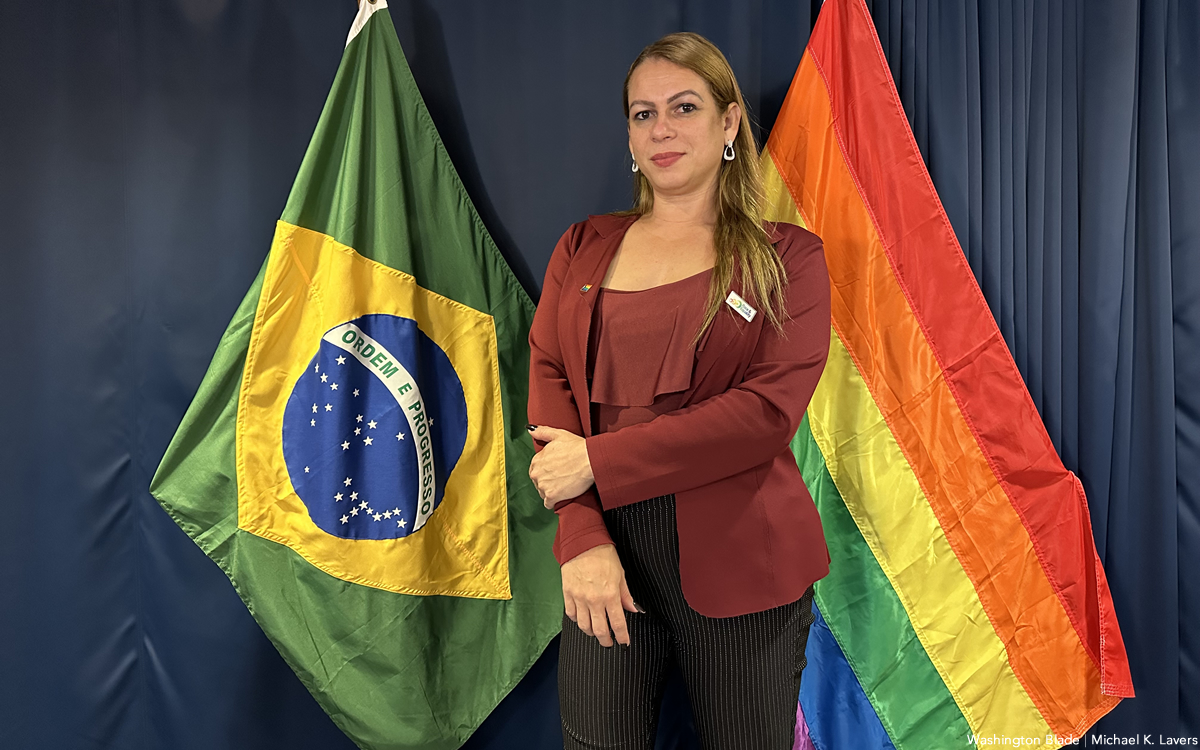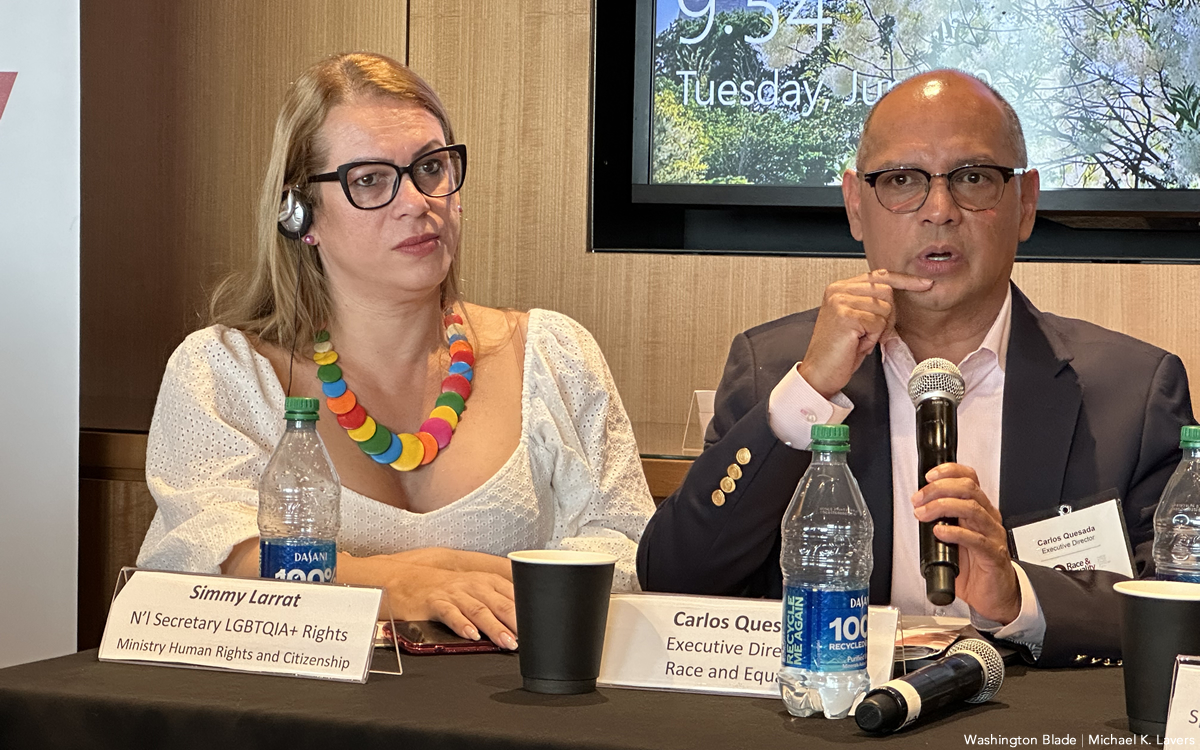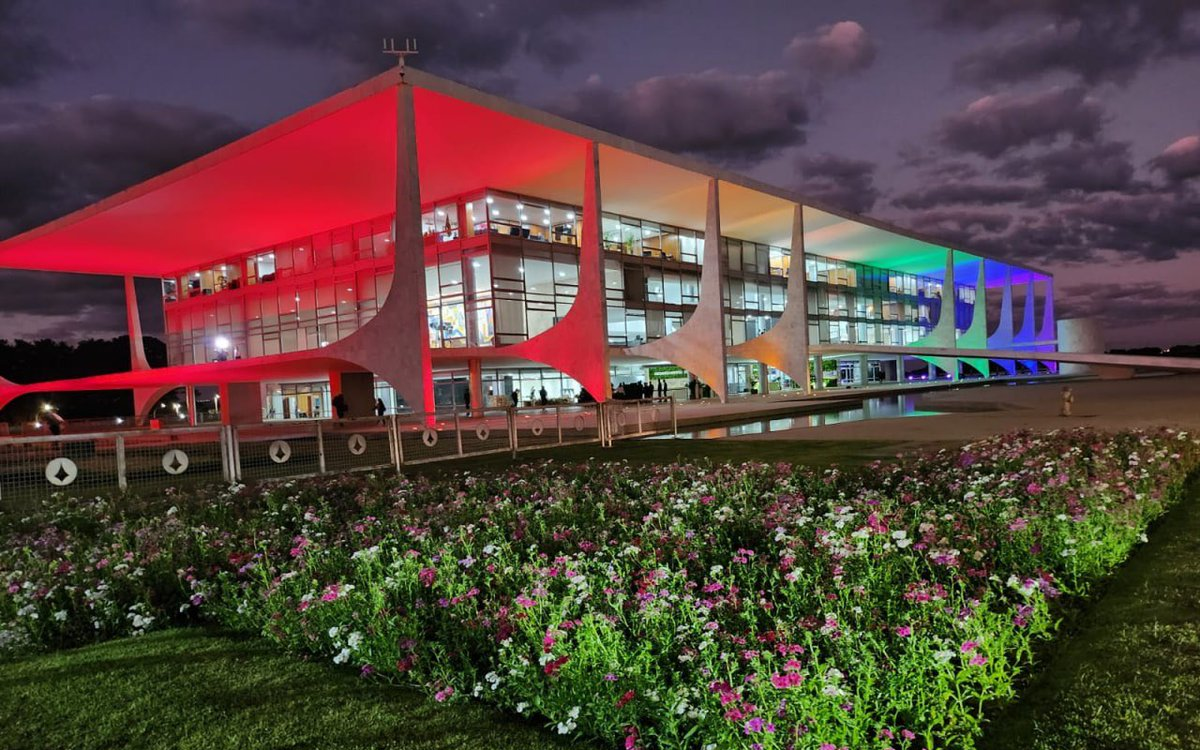South America
Transgender Brazilian government official travels to D.C.
Symmy Larrat sat down with the Washington Blade on June 16

A transgender woman who is a member of Brazilian President Luiz Inácio Lula da Silva’s government said the storming of her country’s Congress, Presidential Palace and Supreme Court in January sparked outrage among many Brazilians.
Symmy Larrat, who is Brazil’s National Secretary for the Promotion and Defense of the Rights of LGBTQIA+ People, spoke exclusively with the Washington Blade on June 16. She was in D.C. to participate in an Institute on Race, Equality and Human Rights conference.
Thousands of supporters of former President Jair Bolsonaro on Jan. 8 stormed the country’s Congress, Presidential Palace and Supreme Court.
Da Silva took power a week before the insurrection. His predecessor, who did not accept last October’s election results, was in Florida when Da Silva took office.
Bolsonaro has since returned to Brazil.
“There are two aspects of Jan. 8. The first that scares me the most is people now think we won the election and we’re set and nobody protected themselves against what happened,” Larrat told the Blade, speaking through a Brazilian Embassy staffer who translated for her. “That moment signaled for all of us how absurd the extremists are. The other side doesn’t respect the democratic system.”
“On the other hand it showed Brazil that what we were denouncing as a very aggressive posture was a reality,” she added. “Brazilians are very patriotic and people felt offended by it.”

Larrat was born and raised in Belém, a city near the mouth of the Amazon River in the country’s Pará state.
Her parents were history teachers, and she said that’s why she “always had this questioning, curiosity” about different social justice movements. Larrat studied communications at the Federal University of Pará and her advocacy began with what she described to the Blade as “the democratization of communication structures and networks.”
Larrat later became an LGBTQ and intersex rights activist.
She organized Pride parades, helped establish NGOs and founded a shelter and community center for vulnerable LGBTQ and intersex people. Larrat told the Blade she responded to the lack of support for LGBTQ and intersex people in Belém and throughout the Brazilian Amazon.
“That’s what made me sense the necessity of justice and inequality because of the lack of support for LGBT people in the Amazon is just one of the things that we lack in the region,” she said. “It’s a region with a lack of information, technology. It’s a very colonized region in the worst sense of the word; not colonized only by the world, but also colonized by Brazil, the lack of policies for development.”
“It is a region that is very rich with a very poor population, so there is still an extractivist logic. that we develop consumer products and we feed the international regions, but we don’t benefit from what is created,” she added, noting it is often to travel from São Paulo to other countries than it is to fly from the country’s commercial capital to Belém and other cities in the Amazon. “The access is difficult. You don’t have access to medical care, information technology. There’s a lot of difficult access to information and information technology.”
Larrat said she knew she “had a feeling as a teenager that I was transgender, but at that time I didn’t see transgender people in places of power.”
Brazilian model Roberta Close, who is trans, was well-known throughout the country in the 1980s. Larrat said trans people at that time were prominent in Brazilian media and art, but “mostly in a pejorative way.”
“I had the conscience that I needed to study, to take myself out of this situation of vulnerability, so I had to study,” she said.
Larrat came out as trans when she was 30.
She was already active in various social movements, but she engaged in sex work “to survive.” Larrat said her family kicked her out of their home when she was a teenager, but she “reconnected with” her mother after she transitioned. Larrat told the Blade that her family now accepts her gender identity.
“The truth was what I was saying gave her (my mother) an understanding of my suffering and then she accompanied me with all my transitioning processes and that made her understand and she got scared about aggressions that I may suffer from society,” she said. “That’s when we reconnected, with her and with all of her family. Today they’re very accepting of it.”
Bolsonaro government was ‘terrifying’
Former President Dilma Rousseff’s government in 2013 invited Larrat to join the country’s Human Rights Ministry as an assistant for LGBTQ and intersex rights. Larrat joked she “was prostituting myself at night … and the next night I went to Brasília to go to the federal government.”
“That’s exactly what happened,” she said.
Larrat left the government once Rousseff was impeached in 2016.
Bolsonaro, a former congressman and former Brazilian Army captain, took office in 2019. He faced sharp criticism because of his rhetoric against LGBTQ and intersex Brazilians, women, people of African and indigenous descent and other groups.
The former president, among other things, encouraged fathers to beat their sons if they came out as gay. A Brazilian Federal Police investigator last August called for prosecutors to charge Bolsonaro with incitement for spreading false information about COVID-19 after he said people who are vaccinated against the virus are at increased risk for AIDS.
“It was terrifying to be there during the Bolsonaro government because we were seeing the public policies all being deconstructed, being destroyed,” said Larrat. “We knew the impacts of it on the lives of people, but it was a shock to all of us the institutionalization of hate speech.”
Larrat further stressed the majority of Brazilians do “not agree with the hate speech, but they are influenced by it.” Larrat also said this hate speech — “we have to protect our children. I can be who I am, but I cannot be it in front of children” — is part of a larger strategy to make Brazilians afraid of LGBTQ and intersex people.
“It’s speech that paints us as a menace and puts fear in people,” she said.

Brazil’s Supreme Electoral Tribunal on Friday banned Bolsonaro from running for office until 2030. The Associated Press noted five of the court’s seven judges agreed the former president used “official communications channels to promote his campaign” and spread disinformation about last year’s election.
Larrat admitted the 2022 campaign was “very difficult” for Brazil. She stressed Da Silva won, in part, because he believes in democracy.
“The power of dialogue that he has is impressive; the capacity to speak to everybody, to speak with both sides on each day,” said Larrat. “He negotiates with both sides. He’s a very good political articulator.”

Congresswomen Erika Hilton and Duda Salabert, who are both transgender, won their respective elections last October.
Larrat, who said she is friends with both of them, told the Blade trans Brazilians still lack representation in the country’s political process. Larrat, however, did stress Hilton and Salabert’s election is an important step forward for the country.
“It’s still very little,” said Larrat. “We went from nothing to something.”

Chile
Transgender woman sues Chilean national police
Isabella Panes alleges she suffered harassment, exclusion after becoming ‘carabinera’

Isabella Panes in 2022 was celebrated as a symbol of inclusion.
Wearing an olive green uniform and a shy smile, she appeared in the media and on social media as Chile’s first trans female “carabinera” or national police officer. The Carabineros promoted Panes as a sign of openness, but that story has become a dramatic case of institutional discrimination.
Panes today faces the Carabineros in court.
She has denounced a series of systematic acts of exclusion, harassment at work, and violation of fundamental rights that she and her defense team maintains pushed her into a mental health crisis that almost cost her her life.
“My hope is that tomorrow we will be able to live in a world of equality for all. Just that we understand that we are human beings and we have to make life a lot easier for each other,” Panes told the Washington Blade during an exclusive interview.
Panes, 29, grew up in Laja in the Biobío region.
She dreamed of becoming a “carabinera” since she was a child, despite the fact that she faced discrimination because of her gender identity. After years of effort, surgeries and a difficult transition, Panes enrolled in the Carabineros Academy in 2021.
Panes faced the challenge of making her medical processes compatible with the physical demands of training. Even so, she graduated with good marks, and was recognized as part of the new institutional image the Carabineros wanted to project after the 2021 social unrest tarnished their image.
This institutional support disappeared after the media campaign.
Panes alleges she was marginalized from operational duties and relegated to administrative tasks, despite her interest in and training to patrol the streets like any other officers.
“I joined the Carabineros to serve, not to be a marketing decoration,” she said. “I was offered to be part of the change, but only if I kept quiet and accepted the mistreatment.”
The accusations against the Carabineros are serious: Constant mockery by colleagues, dissemination of private information about her personal life, invasive questions about her body and sexual orientation. Panes’s legal representatives said this abuse took place within a context where the institution did not take effective measures to protect their client.
The Carabineros Social Security Administration, known by the Spanish acronym Dipreca, also refused to cover her transition-related medical procedures, arguing they were “aesthetic,” despite medical reports that indicated their importance for Panes’s mental health and well-being.
Panes in January attempted to kill herself by suicide. She managed to survive after calling Chile’s 4141 mental health care number for help.
“They were killing me slowly, from the inside,” said Panes.
Panes has brought her case to the Supreme Court after a lower court ruled in favor of Dipreca’s decision to not cover her medical treatments.
Her legal team in a lawsuit has also accused the Carabineros of employment and systematic discrimination. Panes is seeking damages and institutional reforms.
“The Carabineros used Isabella to clean up its public image, but when it came to guaranteeing real rights, they abandoned her,” said Javiera Zúñiga, spokesperson for the Movement for Homosexual Integration and Liberation, a Chilean advocacy group.
“It is not enough to show up at the Pride march,” she added. “True inclusion is demonstrated in deeds, in daily dealings, in respect for the dignity of all people.”
Panes’s case starkly exposes the limits of diversity policies when there is no deep institutional commitment to implement them.
“I am no longer afraid,” said Panes, ”What happened to me cannot happen again. Not for me, but for all those who come after me.”
Brazil
US lists transgender Brazilian congresswoman’s gender as ‘male’ on visa
Erika Hilton has represented São Paulo since 2022

A transgender Brazilian congresswoman says the U.S. issued her a visa that listed her gender as “male.”
Erika Hilton on Wednesday wrote on her Instagram page that she requested a visa that would have allowed her to travel to the U.S. in order to participate in the Brazil Conference at Harvard University and the Massachusetts Institute of Technology.
The conference took place earlier this month.
“I was classified as ‘male’ by the U.S. government when I went to get my visa,” wrote Hilton, who added a visa she received from the U.S. in 2023 listed her gender as “female.”
Hilton is a Black travesti and former sex worker from São Paulo who won a seat in the Brazilian Congress in 2022. The Washington Blade spoke with Hilton shortly after her election.
“It is a big responsibility … but I feel very honored,” said Hilton. “I very much like to be able to be a representative for my people, and the more than 250,000 people who voted for me have confidence in me,” she said after she spoke at a rally in support of now Brazilian President Luiz Inácio Lula da Silva in a São Paulo square. “This demonstrates that our work has the potential to have a gigantic reach; where we can advance efforts to end death, poverty, misery, genocide that we have.”
President Donald Trump in his inaugural speech announced the federal government’s “official policy” is “there are only two genders, male and female.” The Trump-Vance administration has also banned the State Department from issuing passports with “X” gender markers.
Germany and Denmark are among the countries that have issued travel advisories for trans and nonbinary people who plan to visit the U.S. These warnings come ahead of WorldPride, which is scheduled to take place in D.C. from May 17-June 8.
Hilton said she is “not surprised” the U.S. issued her a visa with a male gender marker.
“I’m also not surprised by the level of hatred and fixation these people have with trans people,” she said. “After all, the documents I presented are rectified, and I’m registered as a woman, even on my birth certificate.”
Hilton further accused the U.S. of “ignoring official documents from other sovereign nations, even from a diplomatic representative.”
“At the end of the day, I’m a Brazilian citizen, and my rights are guaranteed and my existence is respected by our own constitution, legislation, and jurisprudence,” she said.
Editor’s note: Duda Salabert, another transgender Brazilian congresswoman, also said the U.S. listed her gender as “male” on her American visa.
Argentina
Gay, nonbinary parent fights for family in Argentina’s courts
Leonardo Hatanaka alleges they were fired after requesting paternity leave

An unprecedented case could set an important legal precedent for the rights of labor rights for LGBTQ families in Latin America.
Leonardo Hatanaka, a Brazilian pharmaceutical professional, expects an imminent ruling from the Superior Court of Justice in the Autonomous City of Buenos Aires in a case that alleges discriminatory dismissal based on sexual orientation, gender identity, and xenophobia after their son Matteo’s birth in Argentina via “solidarity gestation.” Human rights organizations and international agencies have followed the case closely.
Genzyme de Argentina S.A. and Sanofi in 2023 fired Hatanaka weeks after they notified them of their son’s paternity and requested 180-day parental leave.
“Matteo’s birth was the realization of a dream and the right to form a family with love, dignity and equality, even if that means having to fight every day for our family to be recognized as such,” Hatanaka told the Washington Blade in an exclusive interview.
The National Institute Against Discrimination, Xenophobia and Racism, a government agency known by the acronym INADI that President Javier Milei’s administration has shut down, in November 2023 said Hatanka’s termination was motivated by discrimination based on sexual orientation and gender identity.
(Milei took office in December 2023.)
The General Directorate of Coexistence in Diversity in Buenos Aires’s government in 2024 said institutional xenophobia motivated the firing.
“I am a gay man, foreign, nonbinary, and I had requested to exercise my right to parental leave,” Hatanaka explained. “The company denied access to a basic right to care, which it does provide in other countries, and did not provide any medical coverage for our son, despite his legal registration with both parents’ names.”
Sanofi did not acknowledge responsibility, offer apologies or any kind of reparations, despite the two rulings.
“It was devastating. I was caring for a newborn, at a moment of enormous vulnerability, and the company chose just that moment to abandon us,” said Hatanaka.
The National Labor Court overturned an initial injunction that ordered Hatanaka’s reinstatement. Hatanaka appealed the decision to the Superior Court of Justice in the Autonomous City of Buenos Aires.
“I hope for justice; that the discrimination suffered is recognized, and that this ruling serves as a precedent for all diverse families and LGBTQ+ people who are seeing their rights violated,” said Hatanaka.
The Argentine LGBT Federation, SOS Homophobie in France, and Mothers of Resistance in Brazil are among the organizations that have expressed their support. The latest U.N. report on anti-LGBTQ discrimination also notes the case.
“Companies must go beyond marketing,” Hatanaka emphasized. “Real inclusion requires concrete actions, consistency, and respect for their own policies.”
Hatanaka stressed that “there are instruments such as the UN Guiding Principles on Business and Human Rights. It is time for them to comply with them.” The lawsuit has also become a symbol of the struggle for equality and protection of families with parents who are the same sex.
“I feel I represent many LGBTQ+ families who live in fear of losing everything by exercising their rights,” said Hatanaka. “LGBTQ+ parenting is legitimate, real and deserves protection. No family should be punished for existing.”
-

 Federal Government5 days ago
Federal Government5 days agoHHS to retire 988 crisis lifeline for LGBTQ youth
-

 District of Columbia5 days ago
District of Columbia5 days agoD.C. police seek help in identifying suspect in anti-gay threats case
-

 Virginia2 days ago
Virginia2 days agoYoungkin calls on gay Va. GOP LG candidate to exit race over alleged ‘porn’ scandal
-

 Opinions5 days ago
Opinions5 days agoOn Pope Francis, Opus Dei and ongoing religious intolerance












